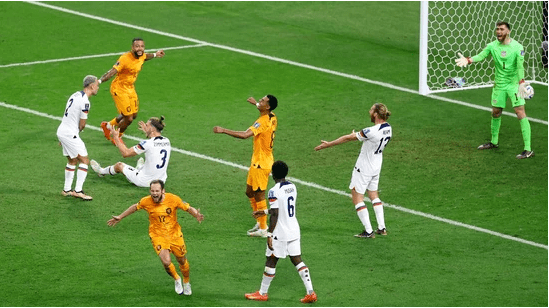The 2022 FIFA World Cup will be the 22nd edition of the FIFA World Cup, a quadrennial international men’s football championship contested by the senior national teams of FIFA member associations. It will be held in Qatar from November 20 to December 18, 2022.
This will be the first FIFA World Cup ever held in the Arab world, as well as the second World Cup held entirely in Asia, following the 2002 tournament in South Korea and Japan.
Furthermore, the tournament will be the last with a 32-team field; the field will be expanded to 48 teams for the 2026 tournament in the United States, Mexico, and Canada.
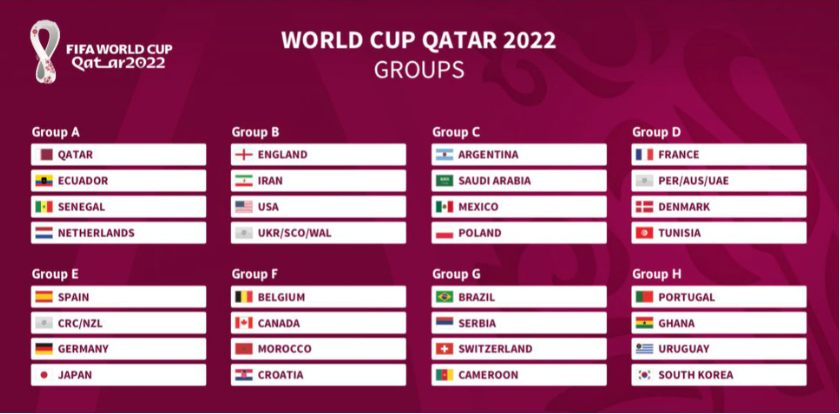
Due to Qatar’s extreme summer heat, this World Cup will be held from late November to mid-December, making it the first tournament not to be held in May, June, or July and to be held in the northern autumn; it will be played over a shorter timeframe of around 29 days. Qatar will play Ecuador in the opening match at Al Bayt Stadium in Al Khor.
The final is scheduled for December 18, 2022, which is also Qatar National Day. France is the reigning World Cup champion.
Choosing a Host for FIFA World Cup 2022
The bidding process for the FIFA World Cups in 2018 and 2022 began in January 2009, and national associations had until February 2nd, 2009, to express their interest.
Eleven bids were initially submitted for the 2018 FIFA World Cup, but Mexico later withdrew from the process, and Indonesia’s bid was rejected by FIFA in February 2010 after the Indonesian Football Association failed to submit a letter of Indonesian government guarantee to support the bid.
Until Qatar was awarded the 2022 FIFA World Cup, Indonesian officials had not ruled out a bid for the 2026 tournament.
All non-UEFA nations gradually withdrew their 2018 bids during the bidding process, ensuring that a UEFA nation would host the 2018 tournament and making UEFA nations ineligible for the 2022 bid.
In the end, five bids for the 2022 FIFA World Cup were submitted: Australia, Japan, Qatar, South Korea, and the United States. On December 2, 2010, the FIFA Executive Committee of twenty-two members met in Zürich to vote on who would host both tournaments.
Two FIFA executive committee members were suspended prior to the vote due to allegations of vote tampering.
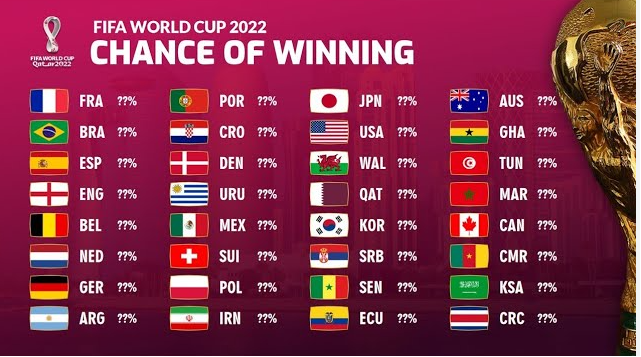
The decision to hold the FIFA World Cup in Qatar in 2022, which was rated as having “high operational risk,” drew criticism from media commentators. Many have accused it of being involved in the FIFA corruption scandals.
Qualification for FIFA World Cup
Each of FIFA’s six continental confederations holds its own qualifying competition. Qualification was open to all FIFA member associations, of which there are currently 211. Qatar qualified for the tournament automatically as the hosts.
The AFC, on the other hand, required Qatar to participate in the Asian qualifying stage because the first two rounds also serve as qualification for the AFC Asian Cup in 2023. Because Qatar advanced to the final stage as group winners, Lebanon, the fifth-best second-place team, advanced instead. France, the reigning World Cup champion, also went through qualifying stages as usual.
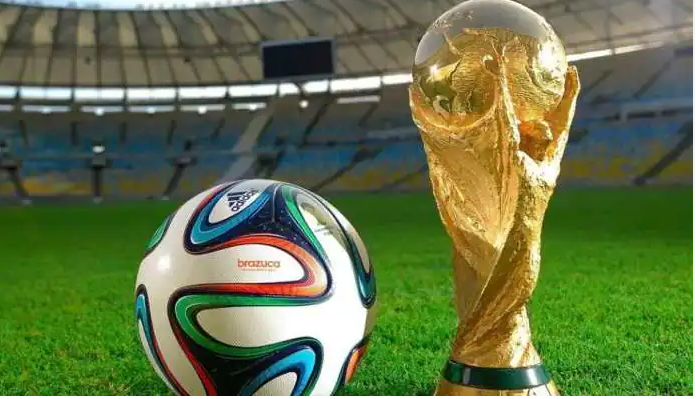
Saint Lucia initially participated in qualification but withdrew before their first match. Because of safety concerns related to the COVID-19 pandemic, North Korea withdrew from the qualifying round. Both American Samoa and Samoa withdrew prior to the OFC draw.
Tonga withdrew following the Hunga Tonga-Hunga Ha’apai eruption and tsunami in 2022. Vanuatu and the Cook Islands also withdrew due to COVID-19 outbreaks in their squads and travel restrictions.
24 of the 32 nations qualified to compete in the 2022 FIFA World Cup competed in the previous tournament in 2018. Qatar is the only team playing in their first FIFA World Cup, becoming the first hosts to do so since Italy in 1934. As a result, the 2022 World Cup will be the first in which none of the teams that qualified for the tournament will be making their debut.
After missing the tournament in 2018, the Netherlands, Ecuador, Ghana, Cameroon, and the United States returned. Canada returned after a 36-year absence, their previous appearance being in 1986. [31] Wales made their first appearance in 64 years, a record for a European team, with their only previous appearance coming in 1958.
Italy, the reigning European champions and four-time world champions, failed to qualify for a second consecutive World Cup for the first time in their history, losing in the qualification play-off semi-finals.
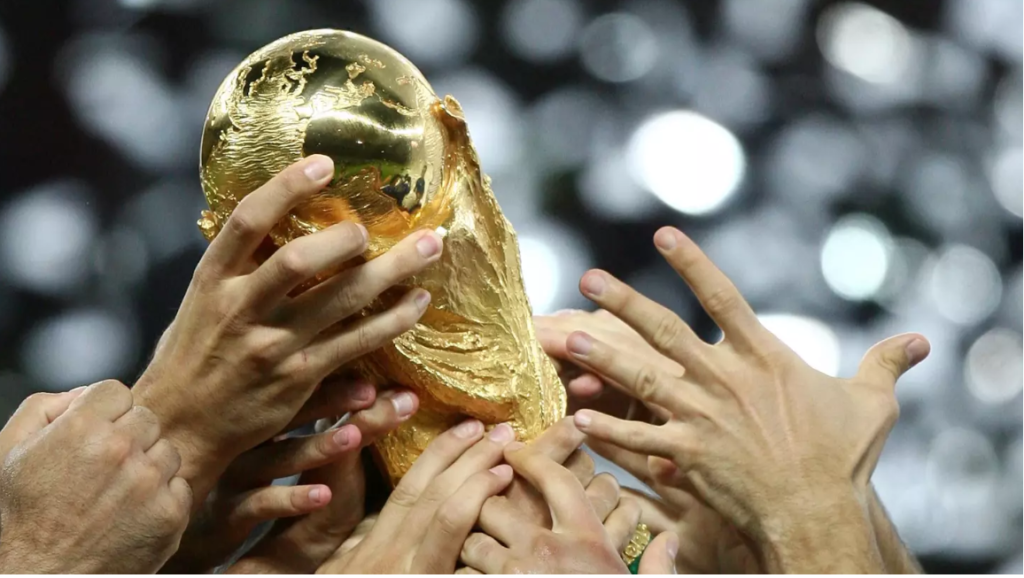
The Italians were the only former champions who did not qualify, despite being the highest ranked team in the FIFA World Rankings. Italy is also the fourth country to fail to qualify for the World Cup after winning the previous UEFA European Championship, following Czechoslovakia in 1978, Denmark in 1994, and Greece in 2006.
Russia, the previous World Cup host, was disqualified from competing due to Russia’s invasion of Ukraine. Chile, the Copa América champion in 2015 and 2016, also failed to qualify for the second time in a row.
Nigeria lost on away goals to Ghana in CAF’s final playoff round, despite having qualified for the previous three World Cups and six of the last seven. Egypt, Panama, Colombia, Peru, Iceland, and Sweden all qualified for the 2018 World Cup but did not make the 2022 tournament.
Ghana, ranked 61st, was the lowest-ranked team to qualify.
Draw:
Prior to the completion of qualification, the final draw was held on 1 April 2022, 19:00 AST, at the Doha Exhibition and Convention Center in Doha, Qatar.
The inter-confederation play-off winners and the winner of Path A of the UEFA play-offs were not known at the time of the draw.
The 32 teams were divided into four pots for the draw based on the FIFA Men’s World Rankings as of March 31, 2022.
The hosts Qatar (who were automatically assigned to position A1) and the top seven teams were in Pot One. The next best eight teams were in pot two, and the next best eight teams were in pot three. Pot 4 included the five lowest-ranked teams, as well as the two inter-confederation play-off winners and the UEFA Path A play-off winner.
Except for UEFA teams, which had at least one and no more than two in each group, teams from the same confederation could not be drawn into the same group. This principle also applied to the placeholder teams, with restrictions imposed based on the confederation of the two potential winners of each play-off tie.
The draw began with pot 1 and ended with pot 4, with each team selected and then alphabetically assigned to the first available group.
The team’s position within the group would then be drawn (for the purposes of the match schedule), with the pot 1 teams automatically drawn into position 1 of each group. The draw pots are depicted below.
Squads for FIFA World Cup
Teams must name a provisional squad of up to 55 players before submitting their final squad for the tournament. Teams were required to submit their 55-player roster to FIFA by October 21. They are not required to make this public, but only ten teams have chosen not to as of November 10th. Teams must name their final rosters by November 13th. FIFA increased the final squad size to 26 players in August 2022, up from a total of 23 players in the 2018 edition.
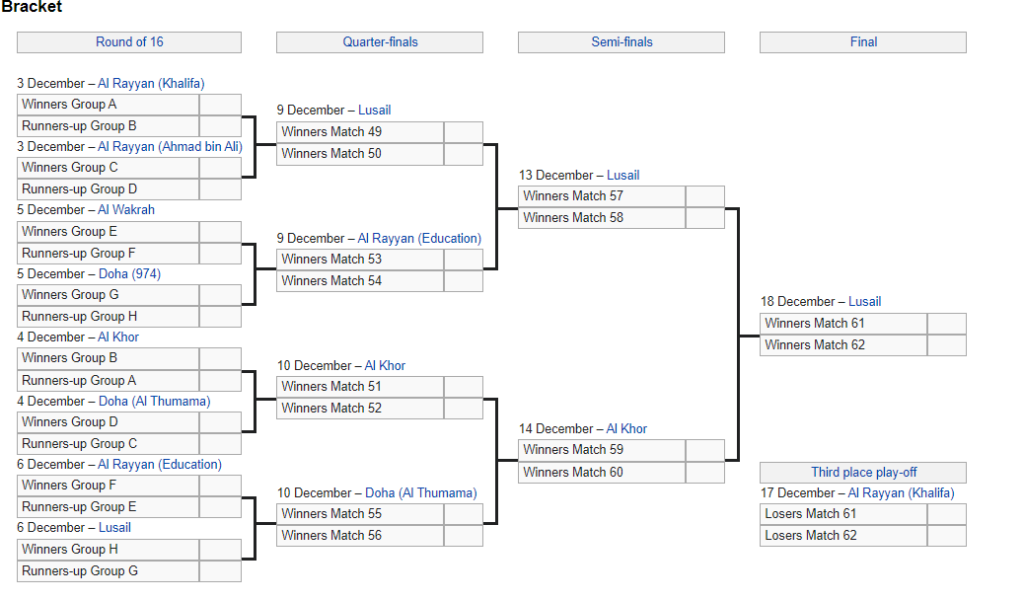
Venues for FIFA World Cup
The first five proposed World Cup venues were announced in early March 2010. The stadiums will be designed to reflect Qatar’s historical and cultural aspects, as well as to meet the following criteria: legacy, comfort, accessibility, and sustainability.
The stadiums will be outfitted with cooling systems that aim to reduce temperatures within the stadium by up to 20 °C (36 °F), though it is unclear whether this will be effective in open-air stadiums.
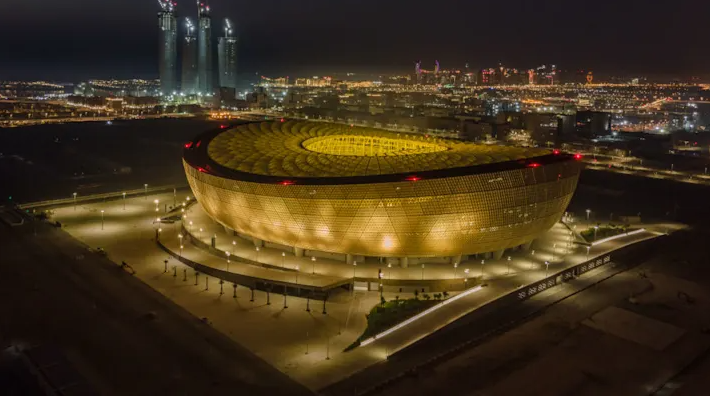
Their marketing includes claims that the stadiums are zero waste, and that the upper tiers will be dismantled after the World Cup and donated to countries with less developed sports infrastructure.
Qatar aspires to have all World Cup stadiums comply with and certified by the Global Sustainability Assessment System (GSAS).
Albert Speer & Partners, a German architectural firm, designed all five stadium projects that have been announced. Al Bayt Stadium will be the only indoor stadium among the eight that will be used.
According to a report published on December 9, 2010, FIFA President Sepp Blatter stated that other countries could host some World Cup matches. The report, however, did not name any specific countries.
Blatter went on to say that any such decision would have to be made by Qatar first and then approved by FIFA’s executive committee.
According to Jordan’s Prince Ali bin Al Hussein, holding games in Bahrain, the United Arab Emirates, and possibly Saudi Arabia will help to integrate the people of the region during the tournament.
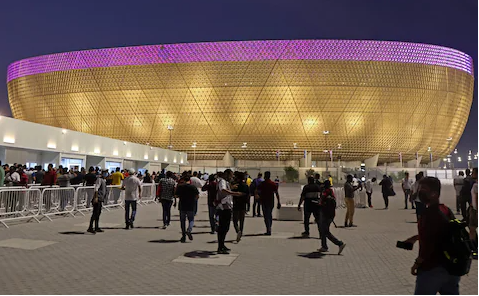
According to a report published in April 2013 by Merrill Lynch, the investment banking division of Bank of America, Qatar’s organisers have requested FIFA to approve a smaller number of stadiums due to rising costs.
According to Bloomberg.com, Qatar wants to reduce the number of venues from twelve to eight or nine.
Although FIFA had yet to finalise the number of stadiums Qatar must have ready in five years, Qatar’s Supreme Committee for Delivery and Legacy stated that it expected there to be eight in and around Doha (with the exception of Al Khor).
Infantino stated in January 2019 that FIFA was looking into the possibility of having neighbouring countries host matches during the tournament to reduce political tensions.
The Lusail Iconic Stadium, which will host 10 matches, including the final, will be the most heavily used. Al Khor’s Al Bayt Stadium will host nine matches. Except for the nine matches in Al Khor, all of the matches in this tournament will take place within a 20-mile (32-kilometer) radius of Doha’s centre. For the first time, all tournament venues will be used for knockout-round matches.
Stadium 974, formerly known as Ras Abu Aboud, is the Supreme Committee for Delivery and Legacy’s seventh FIFA World Cup 2022 venue (SC).
Its name is derived from the number of shipping containers used in its construction as well as the international dialling code for Qatar. During the event, the stadium will host seven matches.
Base camps for FIFA World Cup teams
The 32 national teams will stay and train at base camps before and during the World Cup tournament. FIFA announced the hotels and training locations for each participating team on July 27, 2022. This World Cup is the most compact since the first edition in 1930, with 24 of the 32 teams located within a 10-kilometer radius of one another and concentrated in the Doha area. It is also the first tournament since 1930 in which players will not need to fly to matches and will be able to stay at the same training base throughout the tournament.
Schedule of FIFA World Cup 2022
Unlike previous FIFA World Cups, which have been held in June and July, the 2022 World Cup will be held in November and December to avoid the intense summer heat in Qatar.
As a result, the FIFA World Cup will be held in the midst of the domestic football leagues’ seasons, which begin in late July or August, including all of the major European leagues, which have been forced to incorporate extended breaks into their domestic schedules to accommodate the World Cup.
To avoid playing group matches the following year, major European competitions have scheduled their respective competitions’ group matches to be played before the FIFA World Cup . Domestic leagues, which typically begin their seasons in the northern spring and continue through the summer, will be able to finish their seasons before the tournament begins.
FIFA confirmed the match schedule on July 15, 2020.
The group stage was supposed to start on November 21, with four matches per day; however, the schedule was later changed by moving the Qatar vs Ecuador game to November 20, after Qatar successfully lobbied FIFA to allow their team to open the tournament. Kick-off times for the first two rounds of the group stage are 13:00, 16:00, 19:00, and 22:00, and 18:00 and 22:00 for the final round and knockout stage matches. The third-place match will take place on December 17, 2022, at the Khalifa International Stadium, and the final will take place on December 18, 2022, at the Lusail Iconic Stadium.
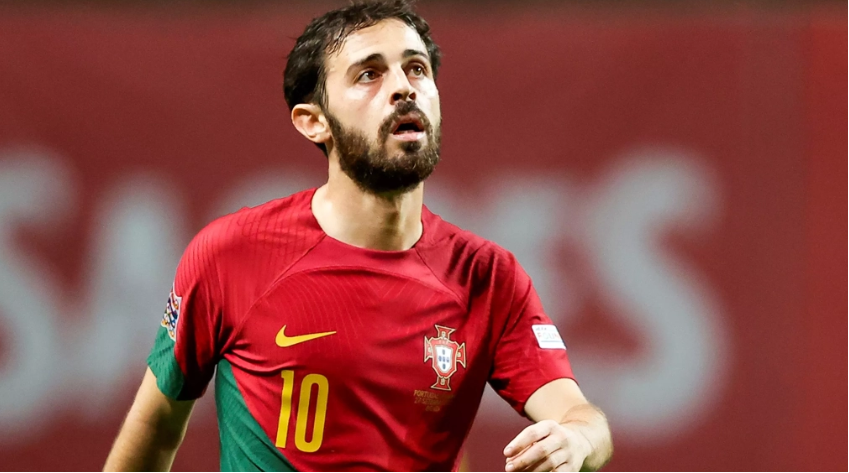
Unlike previous tournaments, where the match venues and kick-off times for each fixture were determined prior to the draw, the assignment of group fixtures for each matchday to a specific venue and kick-off time was made only after the group stage draw was completed and the teams for each specific fixture were known. Because of the venues’ close proximity, the organisers were able to optimise stadium allocation for spectators and kick-off times for television audiences. The only confirmed group stage fixture was Qatar’s first match, which was scheduled to begin at 19:00 on November 21 at the Al Bayt Stadium.
The following stadiums were assigned to each group’s matches:
Al Bayt Stadium, Khalifa International Stadium, Al Thumama Stadium, and Ahmad bin Ali Stadium are in Groups A, B, E, and F.
Lusail Iconic Stadium, Stadium 974, Education City Stadium, and Al Janoub Stadium are in Groups C, D, G, and H.
Following the draw, FIFA confirmed the group stage venue and kick-off times for 1 April 2022. On August 11, it was announced that Qatar vs. Ecuador had been moved up one day, becoming the tournament’s opening match, while Senegal vs. Netherlands, which would have opened the tournament under the original schedule, had been reallocated to the freed-up timeslot.








